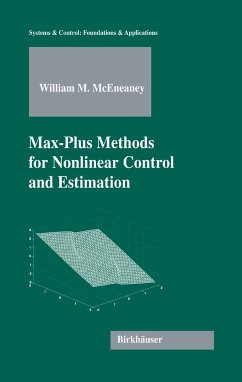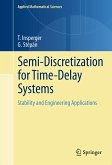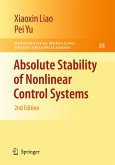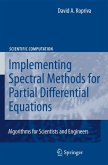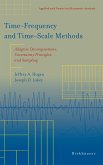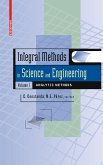The central focus of this book is the control of continuous-time/continuous-space nonlinear systems. Using new techniques that employ the max-plus algebra, the author addresses several classes of nonlinear control problems, including nonlinear optimal control problems and nonlinear robust/H-infinity control and estimation problems. Several numerical techniques are employed, including a max-plus eigenvector approach and an approach that avoids the curse-of-dimensionality.
Well-known dynamic programming arguments show there is a direct relationship between the solution of a control problem and the solution of a corresponding Hamilton-Jacobi-Bellman (HJB) partial differential equation (PDE). The max-plus-based methods examined in this monograph belong to an entirely new class of numerical methods for the solution of nonlinear control problems and their associated HJB PDEs; they are not equivalent to either of the more commonly used finite element or characteristic approaches. The potential advantages of the max-plus-based approaches lie in the fact that solution operators for nonlinear HJB problems are linear over the max-plus algebra, and this linearity is exploited in the construction of algorithms.
The book will be of interest to applied mathematicians, engineers, and graduate students interested in the control of nonlinear systems through the implementation of recently developed numerical methods. Researchers and practitioners tangentially interested in this area will also find a readable, concise discussion of the subject through a careful selection of specific chapters and sections. Basic knowledge of control theory for systems with dynamics governed by differential equations is required.
Well-known dynamic programming arguments show there is a direct relationship between the solution of a control problem and the solution of a corresponding Hamilton-Jacobi-Bellman (HJB) partial differential equation (PDE). The max-plus-based methods examined in this monograph belong to an entirely new class of numerical methods for the solution of nonlinear control problems and their associated HJB PDEs; they are not equivalent to either of the more commonly used finite element or characteristic approaches. The potential advantages of the max-plus-based approaches lie in the fact that solution operators for nonlinear HJB problems are linear over the max-plus algebra, and this linearity is exploited in the construction of algorithms.
The book will be of interest to applied mathematicians, engineers, and graduate students interested in the control of nonlinear systems through the implementation of recently developed numerical methods. Researchers and practitioners tangentially interested in this area will also find a readable, concise discussion of the subject through a careful selection of specific chapters and sections. Basic knowledge of control theory for systems with dynamics governed by differential equations is required.
Dieser Download kann aus rechtlichen Gründen nur mit Rechnungsadresse in A, B, BG, CY, CZ, D, DK, EW, E, FIN, F, GR, HR, H, IRL, I, LT, L, LR, M, NL, PL, P, R, S, SLO, SK ausgeliefert werden.
"As is well known, control and estimation of continuous time and continuous space nonlinear systems are difficult to handle. One frequently uses dynamic programming methods to treat such problems. Central to this approach are solutions of the associated Hamilton-Jacobi-Bellman (HJB) equations. The book under review is motivated by solutions of such problems.... The entire book is divided into nine chapters and an appendix. Chapter 1 provides an introduction, and states why the problem to be studied and methods are needed. Concepts of max-plus methods are also provided.... All in all, this is a nicely written book that introduces important topics." -Mathematical Reviews
"This outstanding book discusses new theoretical approaches to the study of the control and estimation of continuous-time/continuous-space nonlinear systems to be a challenging problem...This book is the first to provide, within a unified framework, a self-contained comprehensive mathematical theory of the max-plus algebra and some basics of functional analysis over the max-plus algebra...The volume is primarily addressed to applied mathematicians...However, the book will also be useful for scientists from the application areas, in particular, applied scientists from engineering and physics." (Jan Lovisek, Zentralblatt MATH, Vol. 1103 (5), 2007)
"This outstanding book discusses new theoretical approaches to the study of the control and estimation of continuous-time/continuous-space nonlinear systems to be a challenging problem...This book is the first to provide, within a unified framework, a self-contained comprehensive mathematical theory of the max-plus algebra and some basics of functional analysis over the max-plus algebra...The volume is primarily addressed to applied mathematicians...However, the book will also be useful for scientists from the application areas, in particular, applied scientists from engineering and physics." (Jan Lovisek, Zentralblatt MATH, Vol. 1103 (5), 2007)

